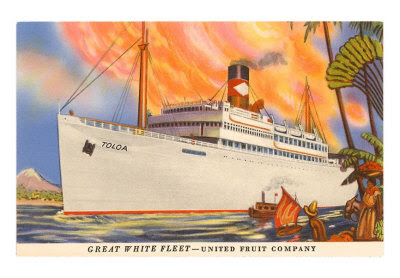Uncommon Grounds by Mark
Pendergrast, 1999, Excerpts
After the 1944 overthrow of Guatemalan dictator Ubico, new
President Arevalo finally abolished ”vagrancy” laws and other forms of forced
labor, and the state assumed ownership of the coffee plantations that had been
expropriated from Germans during the war.
When former general Jacobo Arbenz Guzman assumed the
presidency in 1951, he vowed to transform Guatemala from a dependent nation
with a semi-colonial economy into an economically independent country. The
following year Guatemala passed the Law of Agrarian reform, which called for
the redistribution of public lands.
Those forced to sell would be recompensed based on tax
assessments. The Arbenz government began to hand over more than one hundred
former German coffee plantations to peasant cooperatives. The United Fruit
Company was the hardest-hit foreign corporation, since much of its potential
banana land lay fallow. Its land also had been undervalued to avoid taxation,
so that the company was forced to sell land far below its fair market value.
US Secretary of State John Foster Dulles was trying to force
through a resolution aimed at Guatemala, where social reform threatened
American business interests. As a private lawyer, the new Secretary had
represented the United Fruit Company. His brother, Allen Dulles, the head of
the CIA, had served on the United Fruit board of directors for several years.
Even more than concern for the banana company, however, the United States
perceived Arbenz as a threat to American influence in Latin America. Communism
provided a convenient excuse to attack radical nationalist regimes. In August
1953 they convinced President Eisenhower to approve Operation Success, a
clandestine CIA plan to overthrow the Arbenz regime.
Although Operation Success was indeed a success in the short
term, it was a long-term disaster for Guatemala. The country’s new president,
General Carlos Castillo Armas, had been hand picked by the CIA. He swiftly
reversed the progressive tide. He canceled the agrarian reform legislation,
disenfranchised illiterates, restored the secret police, and outlawed all
political parties, labor groups, and peasant organizations. Within a year and a
half Castillo Armas had driven most of the peasants off the land they had
gained under Arbenz.
Unfortunately, that laboratory would breed discontent,
starvation, and dictatorship rather that happiness, economic boon, and
democracy. Castillo Armas was assassinated in 1957. The country descended into
three decades of repression, violence, and terror as governmental death squads
and guerilla bands roamed the countryside – a direct legacy of the US
intervention. The coffee elite continued to rely on cheap peasant labor, and
even though many plantation owners deplored the violence and uncertainty under
the repressive military regime, it allowed them to keep their land and status.
See also the Public Relations
Campaign by United Fruit Company

No comments:
Post a Comment